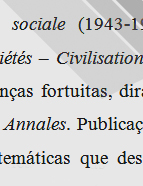

................................
As advanced by Marc Bloch and Lucien Febvre early on, history is not about the individual, it is about society - or when it is about the individual it is within the framework of society. Broadly speaking, it relies on and is connected to all types of knowledge, which would be deemed dangerous. As stated by Georges Duby with respect to the journal "the Annales forced history to look at the other sciences of man and to open itself up to them." (Duby, "Historian", p.13). However, openness was not viewed kindly at Portuguese universities. The Revista Portuguesa de História [Portuguese History Journal] itself (created in 1941), which showed some signs of welcoming innovation in the early 1940s, went on to become a channel for an enclosed group of researchers until the 1960s, despite its efforts to establish external collaboration. Only as that decade advanced did the approaches and interests tend shift to another direction.
Meanwhile, the situation in Lisbon was beginning to change. It was among the first disciples of Vitorino Magalhães Godinho, from his years of lecturing at the Faculty of Letters of Lisbon (1942-1944), that innovation emerged, and new historiographical perspectives opened up. This group included historians who would later become the cultivators of these new approaches: Joel Serrão, Jorge Borges de Macedo, Joaquim Barradas de Carvalho, Margarida Brandão, Julião Soares de Azevedo, José Gentil da Silva, Bandeira Ferreira, Maria de Lourdes Belchior, among several others. "It was thanks to Professor Magalhães Godinho that we became familiar with the new methods of historiography put into practice by the Annales team - Marc Bloch, Lucien Febvre, Fernand Braudel and others" (Soares, Portugal, p. 46). Before then "this historiographical current was barely known" (Godinho, Do oficio, p. 42), thus giving continued attention to the historiography stemming from the teachings and indoctrination of the Annales. This would leave its mark on post-war Portuguese historiography, although hardly ever reaching as high as the universities - or as low as - in the words of Rodrigues Lapa, which earned him the expulsion from higher education in Portugal in 1935. Meanwhile, in Lisbon, Vitorino Magalhães Godinho was still at the centre of a contemporization attempt. Outside the university (after 1944), he invested in updating initiatives, namely through his attempt to create and energize a Portuguese branch of the Parisian Association Marc Bloch, under the name of the Portuguese Society for the History of Civilisation (1949-53).
